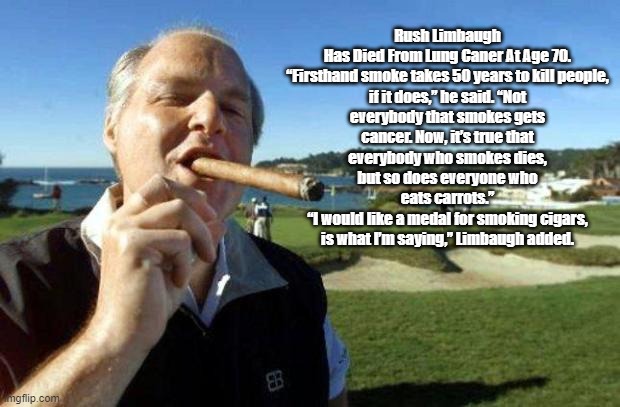Before I get going, I want to apologize for my unexplained absence last weekend. I had jury duty on a medical malpractice case that lasted five days. |
Rush Limbaugh died this week. My take on the totality of his life was that he used his talents to make the world a demonstrably worse place. I’m not a scholar of conservative media, however, so I thought it would be worthwhile to highlight the retrospectives of those who have studied Limbaugh, his peers and their influence on American politics. Writing for CNN, the historian Nicole Hemmer notes how Limbaugh filled a leadership vacuum in the Republican Party and laid down a template for future politicians: |
At the end of the Reagan presidency, the G.O.P. had no popular leader. George H.W. Bush, though elected by wide margins and immensely popular during the first Gulf War, soon slumped in the polls. By 1992, he had been rejected by conservatives and was facing a right-wing challenge from Pat Buchanan in the presidential primaries. Casting about the political landscape, Bush landed on Rush Limbaugh as a possible savior: The popular broadcaster had been promoting Buchanan on his show; if he instead threw his weight behind Bush, perhaps his millions of listeners would come along, too. It was not to be. Limbaugh, after being invited to stay over at the White House, did lavish Bush with praise, but Bush ultimately lost the presidency to Bill Clinton. Yet in singling Limbaugh out as a powerful figure in control of millions of votes, Bush further empowered him. Republican politicians were soon knocking down his door trying to win a few minutes of airtime or an endorsement that would shore up their conservative bona fides. When Republicans took the House of Representatives in 1994’s landslide election, they gave Limbaugh the credit. |
And in an interview with Greg Sargent of The Washington Post, the historian Rick Perlstein connects Limbaugh to the southernization of conservative politics. |
When you talk about nationalized politics, we’re really talking about nationalizing the southern politics of the Civil Rights era, where this kind of conspiracy theorizing, this kind of violence, was common. People like Limbaugh and Gingrich helped institutionalize it in, say, Wisconsin, as opposed to just the south. |
There’s an argument that we shouldn’t connect Limbaugh to conservatism as an ideology, that he represents a perversion or betrayal of its ideas. But I think that’s the wrong approach. If conservatism is anything, it is what conservatives do. And what conservatives have done for the past 30 years — from the highbrow ideology of National Review to the performative cruelty of “Make America Great Again” — is emulate Limbaugh and treat him as a figure of respect and admiration. |
Rush Limbaugh is modern conservatism, and modern conservatism is Rush Limbaugh. |
What I Wrote |
My Tuesday column was on the almost total Trumpification of the Republican Party, and what that might mean for the future: |
That this backlash was completely expected, even banal, should tell you everything you need to know about the so-called civil war in the Republican Party. It doesn’t exist. Outside of a rump faction of (occasional) dissidents, there is no truly meaningful anti-Trump opposition within the party. The civil war, such as it was, ended four-and-a-half years ago when Trump accepted the Republican nomination for president. |
Building off this, my Friday column was about how the Trumpified Republican Party has abandoned any interest in governing: |
Amid awful suffering and deteriorating conditions, Texas Republicans decided to fight a culture war. In doing so, they are emblematic of the national party, which has abandoned even the pretense of governance in favor of the celebration of endless grievance. |
Now Reading |
Chris Hayes on the Republican Party’s turn against democracy in The Atlantic. |
Gabriel Winant on backlash politics in Dissent magazine. |
Seth Abramovitch on the actress Shelley Duvall in The Hollywood Reporter. |
Kelsey McKinney on the unfolding disaster in Texas in Defector. |
Steven Klein on the rise of the conservative welfare state in Foreign Policy. |
Feedback |


No comments:
Post a Comment